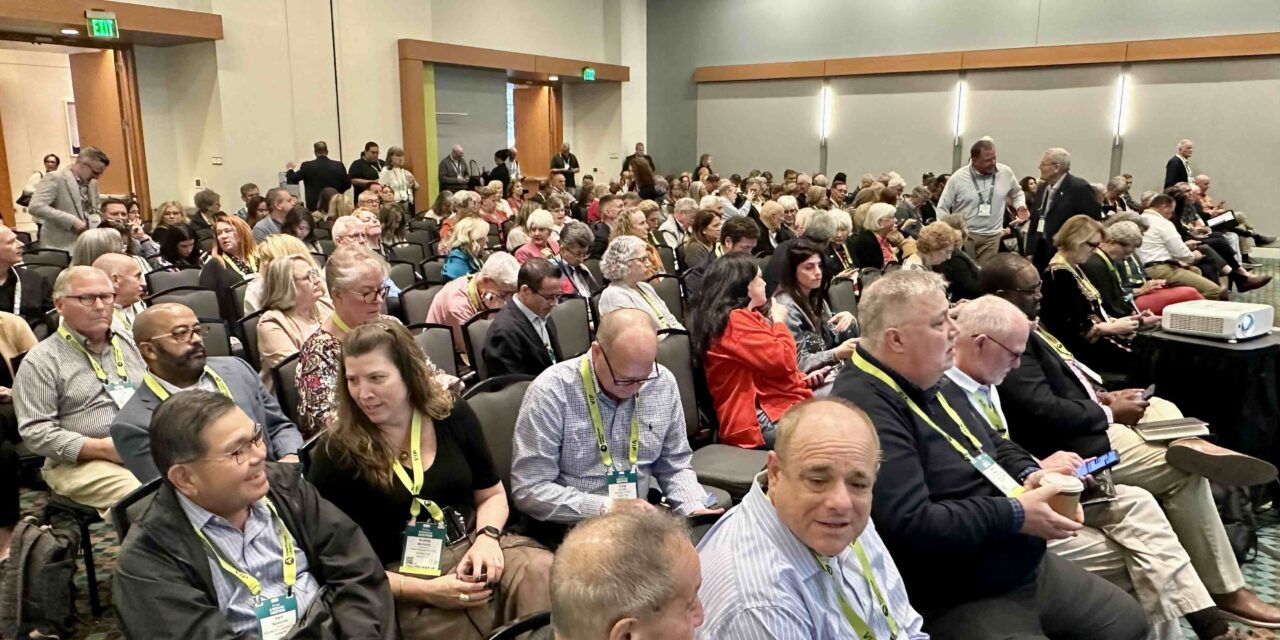By Jack Cumming
LeadingAge is back in full force at the Music City Center convention hall in Nashville. The first day, Sunday, though, differed from what I’ve experienced in the past. Usually, the annual conference opens with an extravaganza with loud, amplified music and uplifting speeches in an enormous meeting hall with thousands in attendance. I expected the same this year. After all, Nashville is Music City.
Opening With AI
The surprise was that Sunday was given over to three educational sessions with substantial content. At least, I attended three. More were offered, but one had to choose just three. The first session was on artificial intelligence, and the room was packed with many people standing for the full hour around the perimeter. No one left the discussion.
Jack York, of Talegate, moderated, and, as you’d expect, he opened with a telling story. The year was 1975. Jack was still a child. His father loved numbers, which he manipulated with a slide rule. One day, a visitor brought a newfangled calculator from Texas Instruments. His father tried not to be out-calculated. Jack watched in fascination and realized he was watching the dawn of a new era. Jack closed by realizing that he now felt about AI as his father must then have thought about that calculator. Perhaps we are destined to become our parents.
The other panelists were not intimidated. Sarah Thomas is an expert in age-tech capital; Roeland Pelgrims heads Nobi Smart Lamps, which helps accelerate response to falls; and Joe Velderman is the technology officer every CEO wishes she or he had on staff. Joe is VP of innovation for Cypress Living in Florida.
The Telling Moment
The telling moment, for me, at least, came when someone asked about the pace with which change is coming. Joe was quick to answer. “This is a Kodak moment,” he said, “and I don’t mean that in a good way.” He went on to explain that Kodak was slow to adapt to digital photography, and now it’s a largely forgotten enterprise. No one wants to be the forgotten industry of yesteryear. The takeaway: Get with technology now or be forgotten tomorrow.
Others asked about how to deal with staff, resident, and public pushback — and in general with the ethics of AI. Not surprisingly, all panelists are optimistic about the future with AI. I was surprised that none of them spoke specifically of the neural net breakthrough that has made the sudden advent of AI so exponential after years of incremental advances. They may have thought that too technical for a largely lay audience.
In any event, there is already considerable bewilderment within senior living about the future of AI and what it portends for senior living providers. In some cases, there is pushback. Many residents are wary about privacy. The common response is to continue business as usual while warily watching developments. That was evident in the number of people crowding into rooms 101AB at the Music City Center. The panelists already have accepted the coming era. That is less likely among most of the residents and providers in the room.
On to Board Management
AI was followed across the hall in a session titled “Do You Need Better Board Members or Better Board Process?” The moderator was Diane Burfeindt of Triology Connect, and she was joined by Doug Leidig of Asbury Communities and Daphne Schneider of Seattle’s Emerald Communities. This session was more what you might expect than the AI session.
Again, looking for the most informative moment, I was struck by Diane Burfeindt’s assertion that she often hears board members say, “I’m not sure what’s expected of me as a director.” That reminded me of something I read of early in my career. On September 29, 1905, Jacob Schiff the senior partner of Kuhn Loeb, testified about the limits of his directorial service on the board of the Equitable Life Assurance Society of the United States.
Charles Evans Hughes, who in 1916 ran for president against Woodrow Wilson and who still later was chief justice of the US Supreme Court, asked Mr. Loeb, “What did you do as a director?”
Answer:
I directed so much as under prevailing usages in corporations was permitted me to direct. I went to meetings of the society when they were called, I listened to the reports as submitted by the executive officers, and I voted upon the same and I gave such advice as was asked of me.
Listening to the discussion at LeadingAge, those remarks from 120 years ago still pertain today. The question of whether it is appropriate to leverage resident entrance fees as equity capital to fund not-for-profit expansion was not discussed.
Residents in Governance
The third session I attended was titled, “Are Residents Welcome to Help You Govern and Lead?” The unlikely panel was filled with representatives from Pennswood Village, a Quaker community, and the Army Residence Community. Jane Mack of Friends Service Alliance noted the irony of pairing pacifist Quakers with professional Army officers.
What they had in common was that both organizations welcome resident input into governance. Both recently went through strategic planning exercises with significant resident input. Both retained Olivia Mastry as a highly competent facilitator to help with the resident involvement in the strategic planning process.
My experience is that such extensive resident involvement in governance is rare. Given the activist generation now coming into senior living, and their expected greater longevity and vitality, it’s likely that such involvement will be more the future than not.
All in all, day one of the conference was a very promising beginning to meetings that continue through Wednesday.






Keep the reports coming.